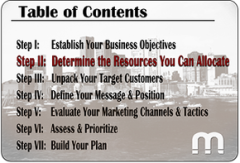Magnetude Blog Series: A First-Time Founder's Guide to Building a Marketing Plan (Step II)

Welcome back to Magnetude Mondays. This week we provide guidance to help you decide where and how to spend your marketing resources.
Step II: Determine Resources to Allocate
By being pragmatic about your desired level of investment, you can build a plan that is appropriate and achievable.
Key Questions to ask Yourself:
- How many hours should our senior leaders spend on marketing in a given week?
- What is the best use of their time versus what should we commission outsiders to help execute?
- How much money are we able to spend on marketing?
- What kinds of goals do we have for marketing?
- Do we need help to define a go-to-market strategy? Or do we what to do and just need the discipline and manpower to get it done?
With these answers in mind, consider your resources from two standpoints—people and dollars.
Human Resources
First, determine the human resources you are willing to allocate. A good approach is to think in terms of hours per week. Consider any full time employees you have and what time and skills they can bring to the table. Build a list of contributors, skills they bring to the table, and number of hours they can likely contribute.
Budgets
While every startup’s situation is different, a few rules of thumb can help you determine where to start:
-
- Define a minimum and maximum budget. By starting with a range, you’ll later be able to weigh the pros and cons of going on the higher or lower ends of the range based on the marketing activities you’ll want to execute later.
- Consider the human resources you’ll need to hire as part of the budgeting process. If you find you have the majority of the skill sets and time in-house, you may need minimal external marketing support. On the other hand, if your team is already spread too thin or if your experience or skill set is elsewhere, you may choose to hire an expert that can take the lead in driving your marketing activities forward.
- Consider the expected impact and importance. Deciding how important marketing is to your growth strategy may help you determine how much to allocate. If you have a groundbreaking product, a stellar sales rep, and some high profile beta customers, you may focus just on tactical marketing execution to drive your business forward and invest incrementally as needed. On the other hand, if you are in a very competitive industry and are having a hard time getting your target market’s attention, the success of your business might depend on establishing a strong message and a well-developed position, supported by aggressive and innovative marketing programs.
Visit us next Monday when we discuss “Getting to Know Your Target Customer” and follow us on Twitter to stay up to date with the release of our latest blog posts.
If you are a step ahead and already have a pressing marketing need, please reach out and contact us.